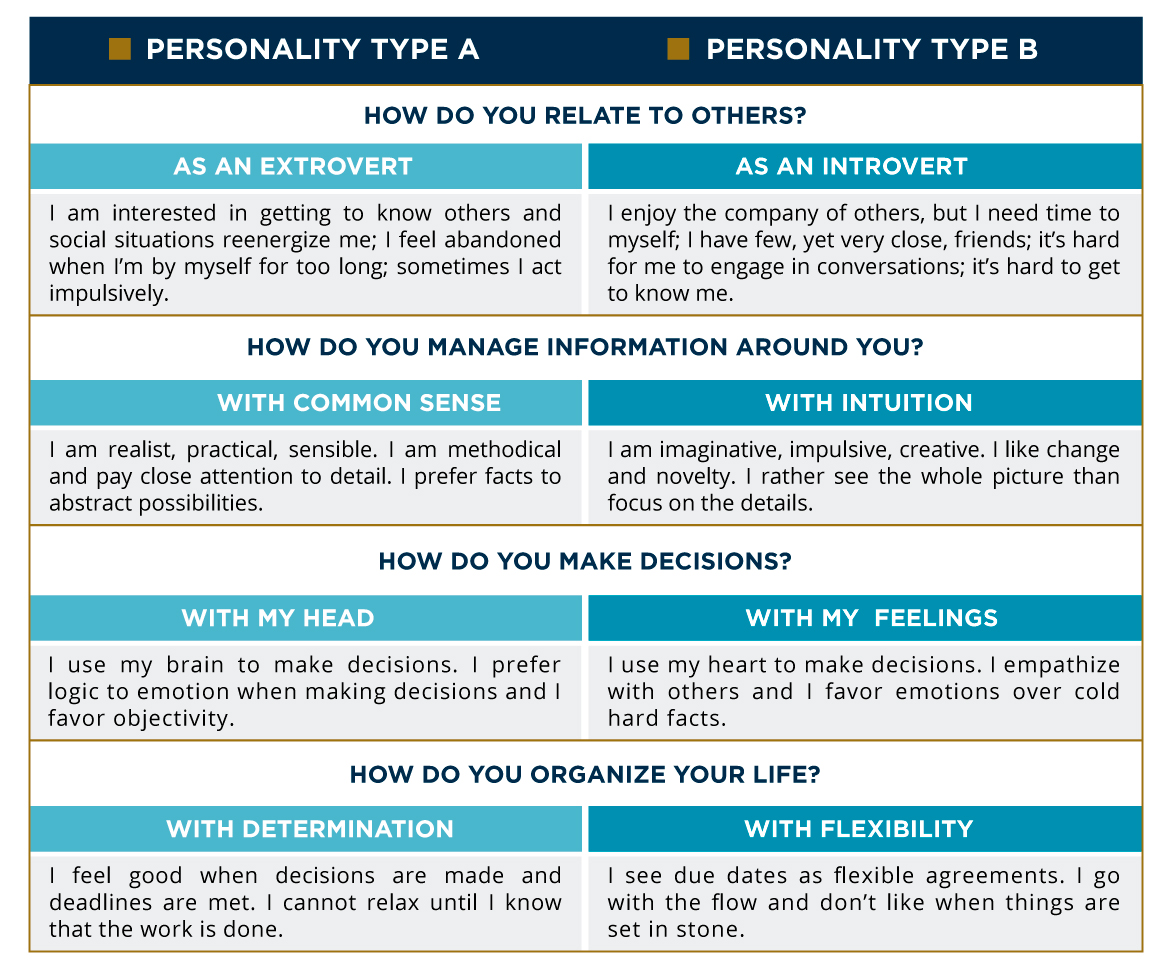10 Oct 2017
Is My Personality An Asset Or A Health Risk?

Personality
In a nut shell, it refers to individual differences in beliefs, feelings and behaviors[1] stemming from biological and environmental factors[2], which begin to develop early on in childhood (even before speech is developed), but continue evolving significantly over an entire lifetime[3].
Did you know that it means “mask” in Latin?
The Theory of A and B Personality Types
According to the A and B Personality theory, people can be classified into three large personality type risk groups; the first (type A) is for competitive and aggressive individuals, the second (type B) is for more passive and subdued individuals, and the third one (AB), is a combination of both[4].
Which personality am I?

Risks Associated To My Personality Type
According to research done by Friedman and Rosenman, the cardiologists that developed this theory in the 1950s, the risk of cardiac disease and hypertension for people with type A personality is almost twice as high as for those with type B personality [5]. Risks associated with type A personality are related to a series of constant triggers such as a sense of urgency, impatience, competitiveness, anger and hostility, that can alter the nervous systems in the body (which regulate organ function and automatic responses, such as breathing) and weaken us[6].
I Am A Type A Personality. What Can I Do To Reduce These Risks?
Better time management to reduce that sense of urgency and impatience. Learn self-control techniques to aid in relaxation. Some tips to manage emotions include[7]:
- Think before speaking (give yourself some time to think about what you will say in a difficult situation; allow others to take their time as well)
- Once you have calmed down, let others know how you feel (assertively and without seeming confrontational to avoid hurting someone)
- Exercise (exercise can help reduce stress levels)
- Take a break (a break between meetings might help you feel better the rest of the day)
- Identify possible solutions (instead of focusing on what bothers you, find solutions. If your partner always shows up late for dinner, set the dinners for a later time)
- Use “I” instead of “you” (instead of blaming others [you always leave dirty plates in the sink], use ‘I’ to address the situation [it bothers me that I always have to wash the dishes])
- Don’t harbor ill feelings (forgiving someone that made you mad can be a good way for both parties to heal)
- Use humor to alleviate stress (sarcasm can be offensive, but a little humor to brush off little annoyances can help relax the body)
- Practice relaxation techniques (take deep breaths, picture a soothing place, listen to music or repeat calming phrases)
- Admit when you need help (controlling anger is a challenge. Seek help if you feel that your anger is beyond your control; if it makes you do things that you regret later; or if you hurt your loved ones)
Now That You Know Your Personality Better
If you would like to get more information about your personality type, take the following free test: https://www.psychologytoday.com/tests/personality/type-personality-test
[1] https://www.simplypsychology.org/personality-a.html
[2] http://www.gbhealthwatch.com/Trait-TypeA-Personality.php
[3] http://www.mayoclinic.org/healthy-lifestyle/adult-health/in-depth/anger-management/art-20045434
[4] http://www.apa.org/topics/personality/
[5] https://en.wikipedia.org/wiki/Personality#cite_note-Handbook-1
[6] https://en.wikipedia.org/wiki/Personality_development#cite_note-Roberts.2C_B._W._2010_pp._375-398-2
[7] https://www.theguardian.com/lifeandstyle/2009/mar/07/personality-type-a-type-b


